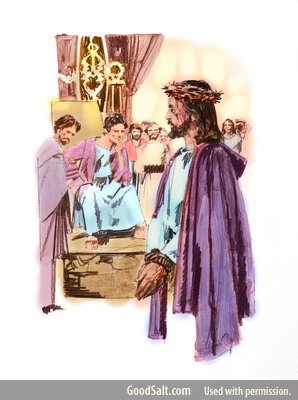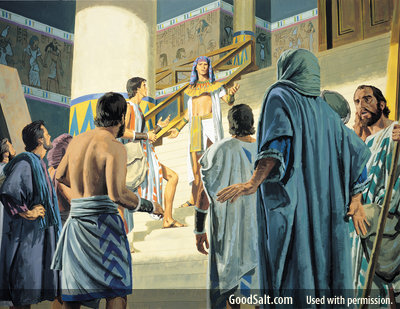“15 Then the Lord said to him: ‘Go, return on your way to the Wilderness of Damascus… 18 Yet I have reserved seven thousand in Israel, all whose knees have not bowed to Baal, and every mouth that has not kissed him.’ “ I Kings 19:15a, 18
Remember how Elijah felt in verse 14? “Lord, Your people don’t care about You and I’m the only one left who does. I’m the only one left standing for what is right! I’m the only one left trying to serve You and that’s very discouraging.” Do you ever feel like that? Alone, afraid, and angry?
Then God has to tell us what He told Elijah – “15 Then the Lord said to him: ‘Go, return on your way to the Wilderness of Damascus… 18 Yet I have reserved seven thousand in Israel, all whose knees have not bowed to Baal, and every mouth that has not kissed him.’ “ (I Kings 19:15a, 18). Circle the word “Go.” God is saying, “Get moving. Don’t sit in the cave of life feeling sorry for yourself. There is more to be done and I am doing things you don’t even know about that will encourage you and help you.”
This leads to our final step out of the pit of discouragement: GET MOVING, KNOWING WE DON’T HAVE THE WHOLE PICTURE (I Kings 19:15a, 18). We don’t have to have the whole picture to move out for God. God has a journey for us to take…a course for us to follow. He is inviting us to step out in faith, believing He is already at work behind the scenes to prepare the way for us.
Jesus Christ wants to lift us out of our pit of discouragement. He can help us; He can change us; He can heal us of discouragement. We don’t have to go through life being controlled by our emotions. Our emotions are controlled by our thoughts, and even though we cannot directly control our feelings, we can control what we think about with God’s help. We can choose to change our thoughts.
This is what Jesus is saying in John 8:31-32: “31 Then Jesus said to those Jews who believed Him, ‘ If you abide in My word, you are My disciples indeed. 32 And you shall know the truth, and the truth shall make you free.’”The opposite of truth is falsehood or lies. The Lord Jesus wants to change our false beliefs that can keep us enslaved to harmful habits, hurts, and hang-ups, including discouragement.
I’d like to share some lies that have contributed to discouragement in my life along with the truth that is setting me free from them:
Lie: I am alone and unloved.
Truth: I am not alone or unloved. I am loved and cherished by the Creator of the Universe.
Scripture: “When my father and mother forsake me, then the Lord will take care of me.” Psalm 27:10
Lie: If somebody criticizes me, it means I’m worthless.
Truth: If somebody criticizes me, it is an opportunity for me to grow.
Scripture: “Princes also sit and speak against me, but Your servant meditates on Your statutes.Your testimonies also are my delight and my counselors.” Psalm 119:23-24
Lie: I must be loved and accepted by everybody to be fulfilled in life.
Truth: It does not matter what other people say or think about me, what matters is that God always loves and accepts me.
Scripture: “The Lord has appeared of old to me, saying: ‘Yes, I have loved you with an everlasting love; therefore with lovingkindness I have drawn you.’ ” Jeremiah 31:3
Lie: I cannot admit any area of weakness; I have to be perfect or else I’m a failure.
Truth: It is good enough to do my best for Jesus, and not be perfect.
Scripture: “And whatever you do, do it heartily, as to the Lord and not to men.” Colossians 3:23
Lie: God is against me.
Truth: God is for me and not against me.
Scripture: “What then shall we say to these things? If God is for us, who can be against us?” Romans 8:31
Lie: I could never be forgiven.
Truth: I am totally forgiven in Christ.
Scripture: “13 And you, being dead in your trespasses and the uncircumcision of your flesh, He has made alive together with Him, having forgiven you all trespasses, 14 having wiped out the handwriting of requirements that was against us, which was contrary to us. And He has taken it out of the way, having nailed it to the cross.” Colossians 2:13-14
Lie: I am an unacceptable person.
Truth: I am totally accepted in Christ.
Scripture: “There is therefore now no condemnation to those who are in Christ Jesus.” Romans 8:1a
“To the praise of the glory of His grace, by which He made us accepted in the Beloved.” Ephesians 1:6
Lie: I do not have what it takes.
Truth: Through Christ who strengthens me I do have what it takes.
Scripture: “I can do all things through Christ who strengthens me.” Philippians 4:13
These are the kinds of lies that cause discouragement. Jesus knew the importance of correct thinking when He said, “31 Then Jesus said to those Jews who believed Him, ‘ If you abide in My word, you are My disciples indeed. 32 And you shall know the truth, and the truth shall make you free.’ ” (John 8:31-32). The more we “abide” or remain in Christ’s word, the more we will know the truth which can deliver us from the lies that can enslave us to discouragement.
You can change. How do you start? By beginning a personal relationship with Jesus Christ. This doesn’t automatically cure all of your discouragement, but without Christ in your life you have no lasting power to change. He wants to be a part of your life, and if you will receive Him by faith, He will come into your life to help you start climbing out of the pit of discouragement.
To help us understand our need for Christ, we need to understand that the Bible makes it clear that all of us have sinned against God. “For all have sinned and fall short of the glory of God.” (Romans 3:23). Our sin separates us from God Who alone is perfect and righteous. “For the wages of sin is death.” (Romans 6:23a). By sinning with our thoughts, words, and actions, we have earned death. The word “death” in the Bible means separation. This means we all deserve to die and be separated from God forever in the lake of fire (Revelation 20:15). I think you will agree that is bad news.
“But the free gift of God is eternal life through Christ Jesus our Lord.” (Romans 6:23b). Notice that eternal life is not through our religion, our good life, or prayers. Eternal life is “through Jesus our Lord.” God sent His Son Jesus to take our punishment on the cross and rise again so we could receive everlasting life as a free gift by believing or trusting in Jesus alone (John 3:16; I Corinthians 15:1-6). Jesus said, “He who believes in Me has everlasting life.” (John 6:47). The word “believe” in the New Testament means to be convinced that something is true and then trust or depend upon.
Jesus is inviting you to believe or trust in Him alone for His gift of forgiveness and everlasting life, not your good life or religion or prayers. If you are ready to believe or trust in Christ alone for His free gift of eternal life, you can tell God this through prayer. Praying this prayer does not get you to heaven. Only trusting in Christ gets us to heaven. Praying this prayer is a way of telling God you are now trusting in His Son, Jesus Christ, to get you to heaven now.
Prayer: Dear God, I come to you as a sinner. I cannot save myself. I believe You died on the cross for all my sins and rose from the dead. I am now trusting You alone, Jesus (not my good life, my religion, or my prayers), to forgive all my sins and give me the gift of eternal life. Thank You for the forgiveness and everlasting life that I now have. Thank You for coming to live inside me through the Holy Spirit. And thank You for the assurance I now have a future home in heaven with You. In Jesus’ name. Amen.
When you trusted in Christ for everlasting life, the Bible says Jesus gave you everlasting life (John 3:16; 10:28). How long does eternal life last? 5 minutes? 5 years? 5 million years? Or forever? Eternal life is forever! It never ends. And it begins the moment you believe in Jesus. Christ now lives inside you through His Holy Spirit and He wants to give you the power to live for Him now (John 7:37-39; Romans 8:9, 11; Galatians 2:20). Jesus in you can enable you to say “No” to Satan’s lies and “Yes” to God’s truth as you learn to trust and obey His Word. He can empower you to climb out of the pit of discouragement and help others to do the same.

To help you grow in your new relationship with Jesus, I recommend downloading our free digital Pressing On discipleship materials to go through with those you care about. This will help you grow in your relationship with Jesus and with those you love.




